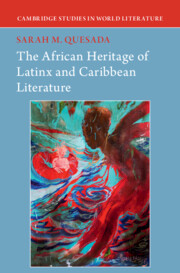Book contents
- The African Heritage of Latinx and Caribbean Literature
- Cambridge Studies in World Literature
- The African Heritage of Latinx and Caribbean Literature
- Copyright page
- Contents
- Illustrations
- Acknowledgments
- Introduction Textual Memorials of a Latin-African Literature
- Chapter 1 Fear
- Chapter 2 Commodification
- Chapter 3 Obliteration
- Chapter 4 Archival Distortion
- Coda
- Notes
- Bibliography
- Index
Chapter 3 - Obliteration
Gabriel García Márquez and His Angolan Chronicles of a “Latin-African” Death Foretold
Published online by Cambridge University Press: 14 July 2022
- The African Heritage of Latinx and Caribbean Literature
- Cambridge Studies in World Literature
- The African Heritage of Latinx and Caribbean Literature
- Copyright page
- Contents
- Illustrations
- Acknowledgments
- Introduction Textual Memorials of a Latin-African Literature
- Chapter 1 Fear
- Chapter 2 Commodification
- Chapter 3 Obliteration
- Chapter 4 Archival Distortion
- Coda
- Notes
- Bibliography
- Index
Summary
Chapter three examines the Black internationalism of Gabriel García Márquez in his Angolan writings, beginning with Chronicle of a Death Foretold (1981). An analysis of this novel’s sunken slave ship carrying Senegalese bodies serves as an access point to García Márquez’s travels in and journalism about Africa that precede the novel: A Latin-Africa of a Cold War era about Portuguese colonialism and US imperialism. Arguing that the Cuban exodus he witnessed in the US sharpened his deeply-rooted criticism of US neocolonialism, his subsequent alignment with Fidel Castro culminated in his chronicle “Operación Carlota” on the Cuban decolonization of Angola. A chronicle named after a woman slave rebellion leader in Cuba it was also used for the Cuban-Angolan victory that led Castro to proclaim Cuba “Latin-African.” Outlining Castro’s signifier for a Global South solidarity through his allegories of slavery, I trace this African axis embedded in both García Márquez’s journalism and fiction. Returning to the lost Senegalese bodies in Crónica de una muerte anunciada, I connect it to the Senegalese slavery memorial par excellence: Gorée’s Maison des esclaves to reflect on the mutually constituting ways in which textual and physical memorials in García Márquez’s foretold death of a Latin-African history.
- Type
- Chapter
- Information
- The African Heritage of Latinx and Caribbean Literature , pp. 117 - 159Publisher: Cambridge University PressPrint publication year: 2022

